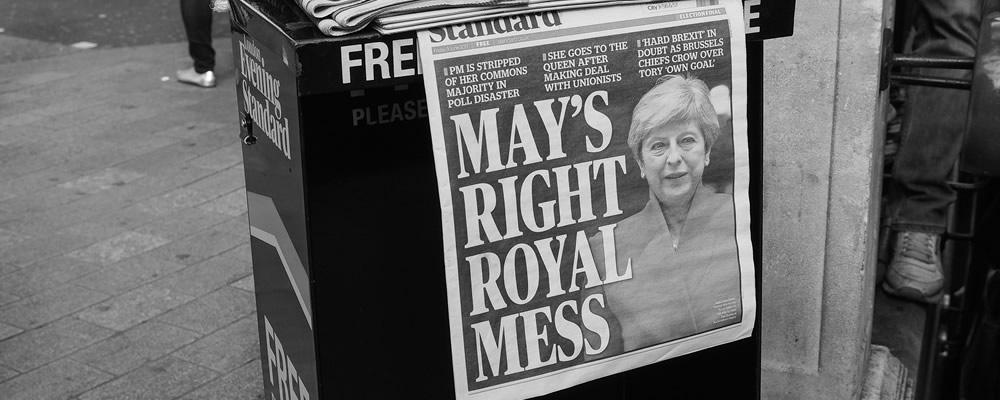The Pound Euro exchange rate plummeted on Monday as investors reacted to weekend news that UK Prime Minister Theresa May was facing increased pressure from within her own party over the Brexit process. Concerns about the strength of May’s government could keep the Pound weak.
After edging higher from 1.1260 to 1.1307 last week, GBP EUR shed most of its gains on Monday and trended near the level of 1.1250.
Pound (GBP) Investors Anxious about UK Government Strength
Brexit speculation continues to be the biggest driver of Pound movement and the biggest indication of the long-term Pound outlook.
This also means that the persistent uncertainty surrounding the Brexit process, and what could happen after the UK leaves the EU in 2019 presents a major downside risk for the Pound in the long-term.
As a result, the Pound has been highly unappealing recently. The Pound experienced yet another selloff on Monday morning as the latest domestic political news worsened concerns about the UK government’s strength in Brexit negotiations.
Over the weekend, The Sunday Times published a report that as many as 40 Conservative MPs were prepared to sign a letter of ‘no confidence’ in UK Prime Minister Theresa May.
While this would fall short of the 48 needed to begin a formal leadership challenge, it indicated that domestic confidence towards May, even among her own party, has been waning since the snap general election was held in June.
There are also rising concerns that ‘hard Brexit’ advocating rebels within the Conservative Party could attempt to undermine May’s position.
UK Foreign Secretary and Environment Secretary Michael Gove, who both campaigned heavily for Brexit in 2016, reportedly wrote a letter to May complaining about the lack of preparation within the government for a potential ‘hard Brexit’.
Senior Conservative officials have doubted the validity of both of these reports, but Pound investors were still spooked on Monday, just days after hopes rose that Brexit negotiations were nearing a point of significant progress.
Any political developments in the coming days, whether domestically or regarding the Brexit process, could have a notable impact on the Pound outlook.
For example, any further signs of weakness with UK Prime Minister Theresa May’s position or her government could cause investors to keep selling the Pound.
Key data could also influence the Pound outlook though.
Britain’s October Consumer Price Index (CPI) report will be published on Tuesday and could cause Bank of England (BoE) speculation if it comes in higher than expected. The same goes for September wage growth data, which will be published on Wednesday.
Euro (EUR) Gains Limited by European Central Bank (ECB) Caution
The Euro strengthened against the Pound on Monday, but this was largely due to Sterling’s own weakness. The Euro has not seen much upside momentum in recent weeks despite strong domestic data.
Markit’s latest Eurozone PMIs, as well as Eurozone retail sales stats, both beat expectations in recent reports. However, the shared currency’s strength remains limited by the European Central Bank’s (ECB) recently cautious outlook.
In its October monetary policy decision, the ECB announced that it would lighten its quantitative easing (QE) program, but extend it to run until September 2018 or beyond.
With the bank not planning to tighten Eurozone monetary policy until after the end of the QE program, and Eurozone inflation forecast to slow in 2018, investors see little reason to continue buying the recently strong Euro.
Still, the currency hasn’t fallen much either and this has helped it to gain when rivals like the Pound weaken. The Euro could still see support from key ecostats in the coming days too.
A slew of highly influential Eurozone data will be published on Tuesday.
This includes Gross Domestic Product (GDP) projections from Q3 for Germany, Italy and the Eurozone as a whole, as well as German inflation stats from October and ZEW’s latest economic sentiment surveys.
More notable data will be published on Thursday, including the Eurozone bloc’s October inflation results.
If Eurozone inflation beat expectations in October, it could boost hopes that inflation may not slow as much as forecast in 2018, which could cause European Central Bank (ECB) speculation to rise again which would boost the Euro outlook too.
GBP EUR Interbank Rate
At the time of writing this article, the Pound Euro exchange rate trended in the region of 1.1248. The Euro to Pound exchange rate traded at around 0.8890.


Comments are closed.